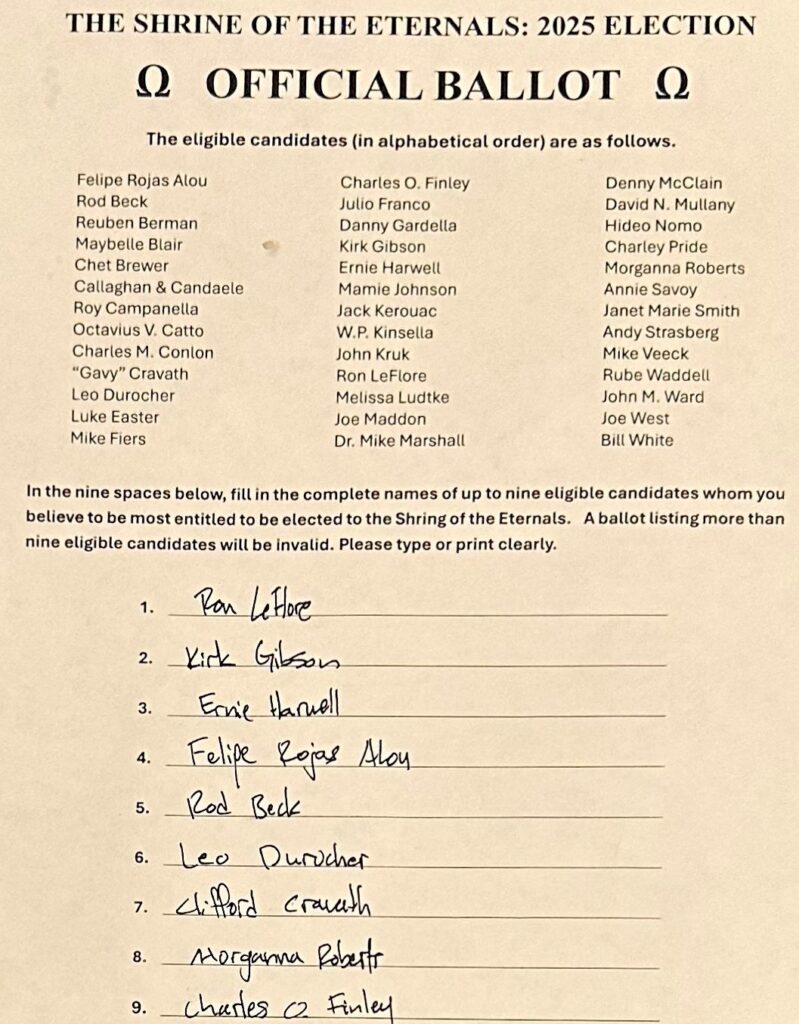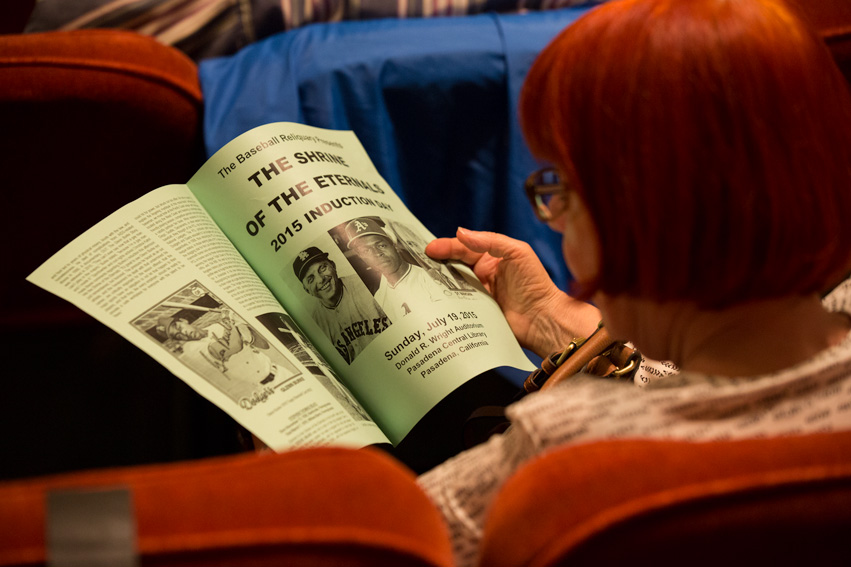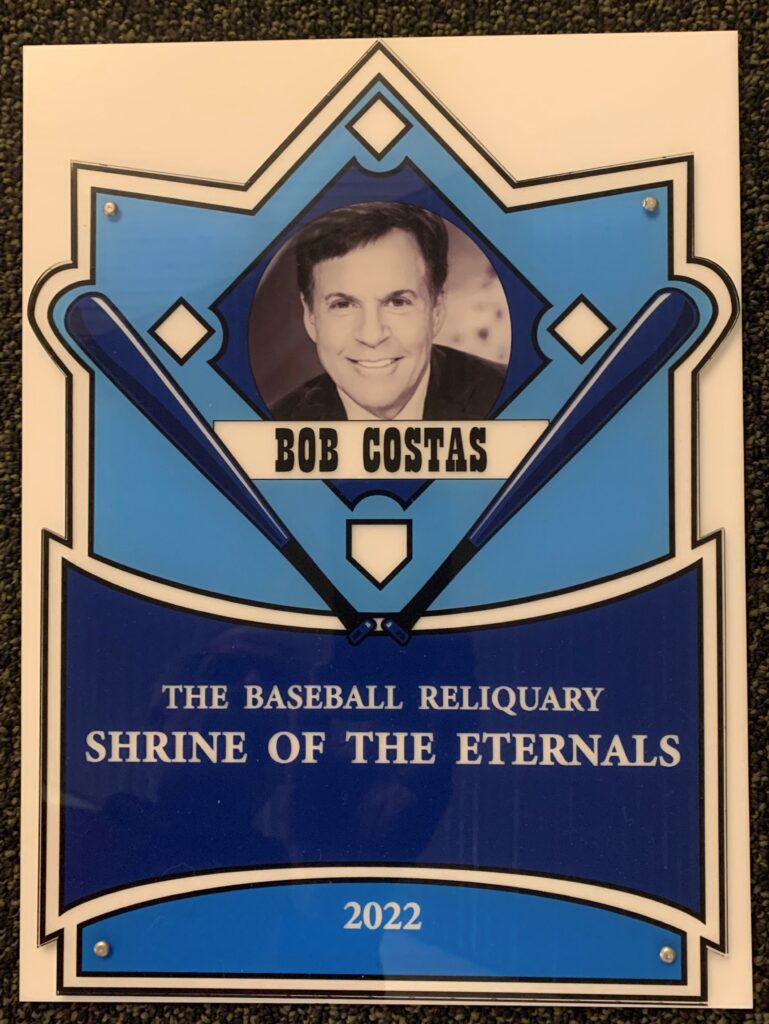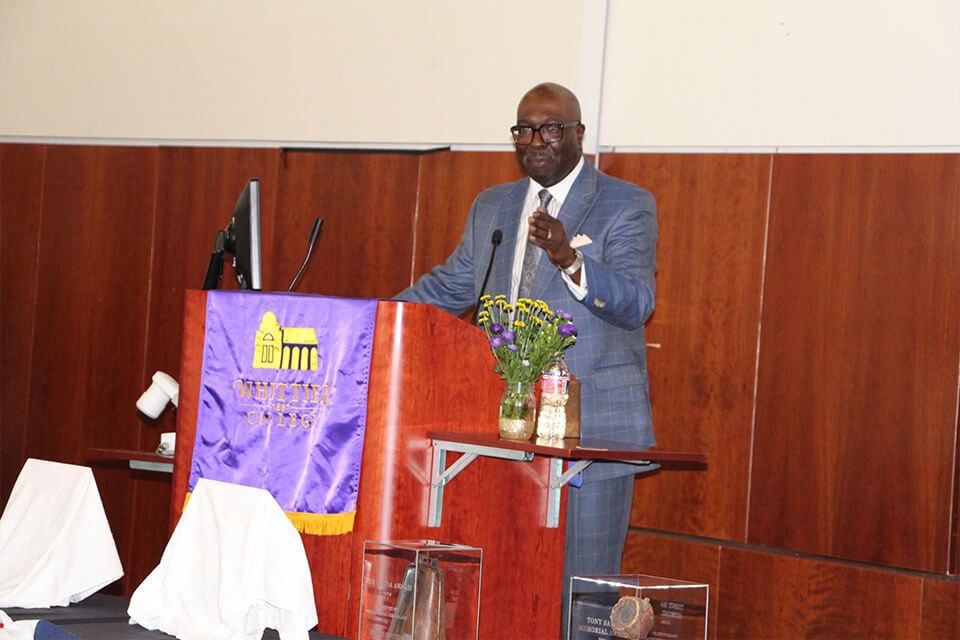
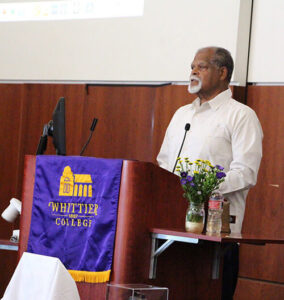
Smith presenting Baker’s award
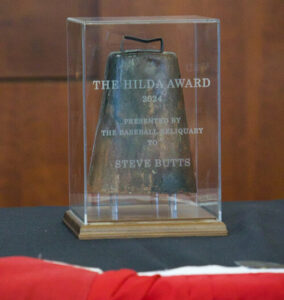
The Hilda Award
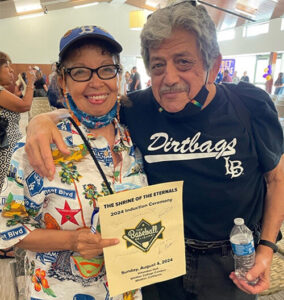
Emma Amaya and Tomas Beneitez enjoy the Shrine induction
The highest honor that the Baseball Reliquary affords an individual is election to its Shrine of the Eternals, the Reliquary’s alternative to the MLB Hall of Fame. Unlike enshrinement in the Cooperstown Hall, eligibility for the Reliquary’s Shrine of the Eternals is based on the quality of candidates’ stories, not their record-setting statistics. And unlike the exclusive process used by the Hall of Fame, the Reliquary’s election process is inclusive, open to all members of the organization.
This year’s shrine ceremony celebrated three honorees—Johnny B. “Dusty” Baker, Effa Manley, and Kim Ng—as well as speakers Bob Kendrick, former Dodger Reggie Smith, and Joni Campanella Roan. Held in early August, the packed-house event was cohosted by Whittier College and its Institute for Baseball Studies, which serves as a repository for the archives and artifacts of the Reliquary.
The stories that surround Baker, Manley, and Ng evince their significance for enshrinement.
As a rookie with the Atlanta Braves, Johnny B. “Dusty” Baker was mentored by Hank Aaron in how to adjust to the Major Leagues and how to deal with racism. During his twenty-year career as a player, he won a World Series with the Dodgers, and he received acclaim as an All Star as well as Silver Slugger and Gold Glove awards. Then spending a quarter-century as a manager, he guided five different teams to post-season play, and he twice was recognized as the National League’s Manager of the Year. He is also recognized for having reestablished integrity among the Houston Astros following their cheating scandal while steering them to a World Championship. Before retiring, he won 2183 games, the twelfth manager to reach 2000 victories and the first African American to do so.
Making the presentation to honor Dusty, former Dodgers photographer Rich Kee quipped that Dusty’s road to Cooperstown runs through Whittier. Although he was unable to attend the ceremony, Baker sent a short video expressing his appreciation for the honor. Then accepting the award on Baker’s behalf, friend and former teammate Reggie Smith noted that “A true superstar is an individual who can make the others around him better, and that was Dusty.”
Presenting the award in memory of Effa Manley, Joni Campanella Roan, daughter of former Dodgers great Roy Campanella, emphasized that “Effa Manley’s character and experience as an enthusiastic baseball fan, an astute baseball executive, and a passionate civil rights activist substantiates her election and induction into the Baseball Reliquary’s Shrine of the Eternals.” She also said that while Manley efficiently and compassionately ran the daily operations of the Newark Eagles, her boldest practices and transactions had been the different ways that she eased her star players’ transitions from the Negro Leagues to National League teams.
Receiving the Shrine plaque to honor Manley, Kathy Robinson Young, a niece of Jackie Robinson, thanked the Reliquary for recognizing Effa’s pioneering accomplishments. Also a pioneering baseball executive, Kim Ng was elected to the Shrine of the Eternals in her first year on the ballot. Her award was presented by Shane Barclay, President of JapanBall and a former colleague of Ng in the Office of the Commissioner. Highlighting Ng’s accomplishments, Shane emphasized that she became the first woman and first Asian American to present and win a salary arbitration, to rise to a Vice Presidency in the Commissioner’s Office, to become a General Manager of a Major League team, and to lead a team to the playoffs.
Representing Ng to receive the award was her good friend and fellow female baseball pioneer Ila Borders, who had been elected into the Reliquary’s Shrine in 2003. “Kim’s somebody that I absolutely admire and look up to,” Borders said. “To see the inspiration that she has given girls on the field and off the field is just amazing.”
Another highlight of the induction ceremony was the keynote address delivered by Bob Kendrick, President of the Negro Leagues Baseball Museum in Kansas City. He emphasized that Jackie Robinson initiated the desegregation of a quintessential American institution seven years before the Supreme Court ruling to desegregate American public education. “This is a civil rights story,” Kendrick said. “This is a social justice story as much as it is a baseball story.” Even so, in Major League Baseball it took twelve years after Robinson’s first game with the Dodgers before every team had at least one black baseball player, with the Boston Red Sox being the last team to integrate in 1959.
Kendrick also noted that knowledgeable baseball fans have often described Josh Gibson as a black Babe Ruth. Then with a wry smile, he added that now since Gibson’s records are recognized by MLB, it might be fair to say that Babe Ruth was a white Josh Gibson.
Rounding out the day’s program, the Reliquary presented two additional awards, one for exemplary fandom and another for work in preserving baseball history. The Hilda Award, named for Brooklyn Dodgers baseball fan Hilda Chester, recognizes distinguished service to fans. Longtime Reliquarian Greg Jezewski presented to award to Steven Butts for his leadership on the Reliquary and Institute social media pages. Accepting the award, Butts expressed appreciation for the recognition of his service, calling the award his highest honor.
Named in honor of a historian and researcher who championed unsung players in Baseball’s Forgotten Heroes, the Tony Salin Award was posthumously awarded to Jean Ardell. In his presentation of the award, David Pegram, editor of NINE: A Journal of Baseball History and Culture, highlighted Ardell’s leadership in the producing decades of NINE’s annual Spring Training Conference. A longtime supporter of the Baseball Reliquary, Ardell consistently promoted the history of women in baseball, especially in two of her major works: Breaking into Baseball and, with Ila Borders, Making My Pitch: A Woman’s Baseball Odyssey. The award was gratefully acknowledged by her husband Dan Ardell and Borders.

